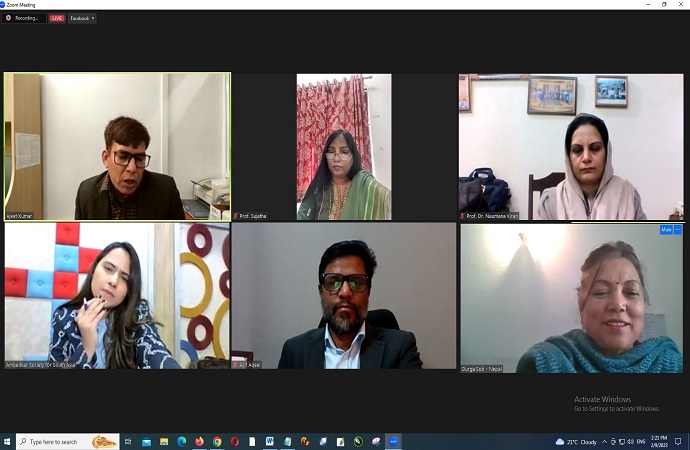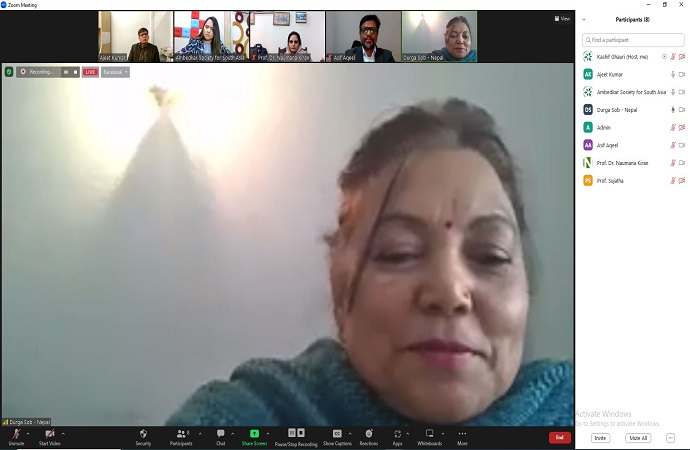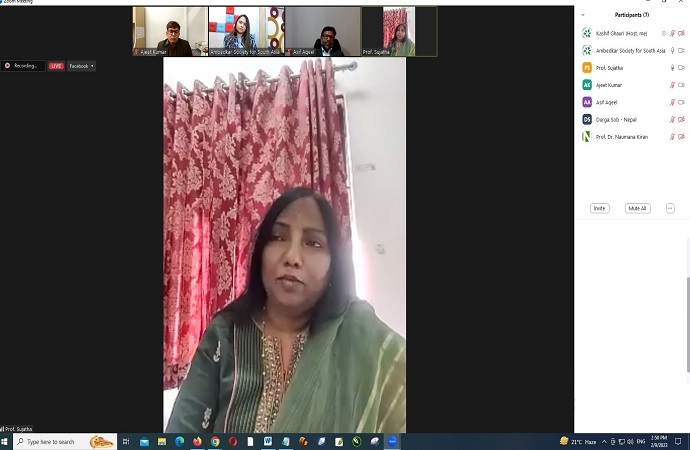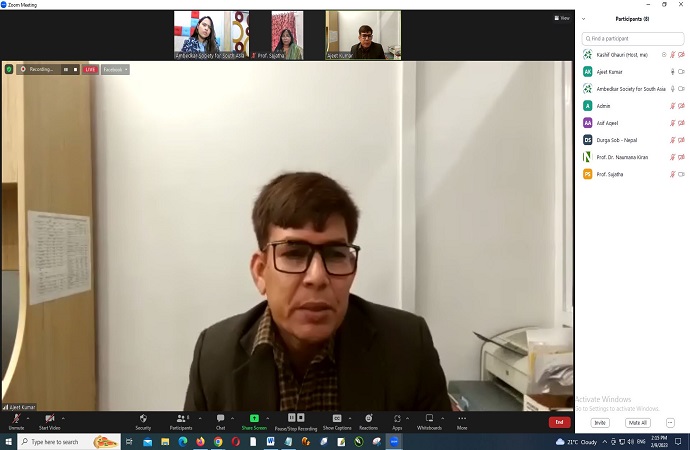*Ambedkar Society for South Asia (ASSA)*
organized an International webinar on 9th February 2023 on the theme of
*"Constitutional
Rights of Marginalized Communities & Its Implementation"*.
Renowned Human Rights Activists and
eminent scholars from both the countries Pakistan and India were invited to speak on the topic. On
this auspicious occasion Six scholars and Journalists shared their point of
view on the topic including:
*1- DURGA SOB* (Founder/Strategic Advisor Feminist Dalit Organization (FEDO), Advisor: Asian Dalit Rights Forum (ADRF), NEPAL)
*2- PROF. DR. SUJATHA SUREPALLY* (Head of the Department of Sociology, Satavahana University, Telangana, INDIA)
*3- PROF. DR. AJEET KUMAR* (Associate Professor, Department of History, Atma Ram Sanatan Dharma College, University of Delhi, New Delhi, INDIA)
*4- PROF. DR. NAUMANA KIRAN* (Professor, Pakistan Study Center, University of the Punjab, Lahore, PAKISTAN)
*5- ASIF AQEEL* (Journalist, Columnist from Christian Community, Lahore, PAKISTAN)
Webinar was hosted by Miss Paroosh who presented a brief introduction to the insides of the topic & elaborated the purpose and objectives of the webinar to all the participants. Professor Pakistan Study Center, University of the Punjab, Dr. Naumana Kiran talked briefly about the rights of marginalized mentioned in the constitution of Pakistan. She said that the constitution of Pakistan provides equality of status, opportunities, justice of all kinds, faith, worship and profession to all the citizens of the country regardless of caste, color, religion, faith or ethnicity. She said that unlike other countries of South Asia, the fundamental rights of minorities and marginalized are being followed to large extent in Pakistan but still there is a room for improvement. For instance, issues related to the family laws of minorities are needed to be addressed as still we are having colonial laws for family and personal laws, so there is a great question mark on the efficiency of system of justice in this region, which is very lethargic. Therefore the system of justice must be improved to ensure the implementation of the constitutionalized rights of marginalised. Dr. Ajeet Kumar said in his speech that more or less the constitution of every country has very clear articles regarding the fundamental rights of marginalised communities and minorities. As far as India is concerned there are provision for SCs/STs, marginalised and minority rights on the basis of religion in its constitution but the problem is always there in terms of implementation which varies from state to state. As a result many people of different communities raised against the local and central governments to brought further legislations like Untouchability laws in 1955, but still it is going on in the society. So the preamble of Indian constitution has many provisions on fundamental rights of marginalised but ground realities are far different. Founder FEDO Nepal, Ms. Durga Sob said that Nepal is a diverse country in terms of geography, linguistics, caste and religion. In 1990, the issues of marginalised communities were brought to light after the democracy reached to the country. Then after the historical peoples movement of 2006, which had the major mandate was inclusion of marginalised communities in the society, so as a result, the new constitution addressed the fundamental rights of minorities and marginalised people very briefly and progressively and became much better after passing through such movements but still the implementation gap is there in the society both on government and community level. Mr. Asif Aqeel said that we in Pakistan faced many challenges after the partition, but Pakistan has comparatively better history regarding the violation of minorities or marginalised. He said that we have a very small minority here in Pakistan, so we have all the freedom of worship, freedom of association etc, but a non-Muslim cannot become the president or prime minister of the country. He talked especially about the Christians of Pakistan who are facing discrimination in the representation in job quotas which is primarily because of the caste system, they came from the Dalit caste. So they are supposed to do the menial jobs just because they are belonging to the Dalit castes. Dr. Sujatha Surepally said that the constitution and its implementation is quite different from each other, Constitution of India has all the provisions regarding the fundamental rights of marginalised communities, but broadly Dalits are still facing humiliations, atrocities and exclusions in the society on the basis of their caste. Because the secularism in India is so fabricated that it doesn't allow the implementation of the articles related to minorities and marginalised. Another issue is structured untouchability in India, so it is just going down in term of fundamental human rights. It is becoming more worst as we are seeing more atrocities and discriminations not only against Dalits but also against the Muslims, Christians and other marginalised sections, so it is important to understand that there is more political moto or vision behind the oppression and suppression of marginalised communities in India. We have to fight more to ensure the implementation of what Ambedkar put into the constitution. She suggested that the education and awareness can definitely bring about a positive change in the society. All participants appreciated the efforts of ASSA to organize such webinars to create awareness among the people.
Click this link to Watch this Webinar : https://www.facebook.com/AmbedkarSocietyForSouthAsia
_________________
















